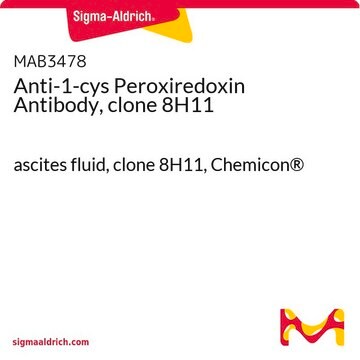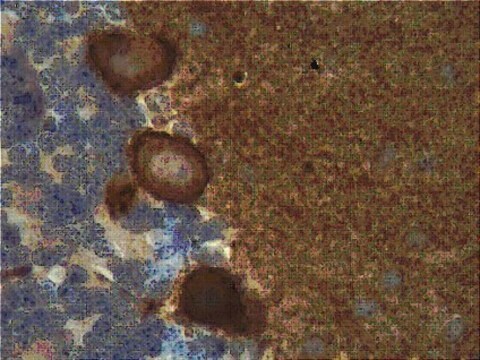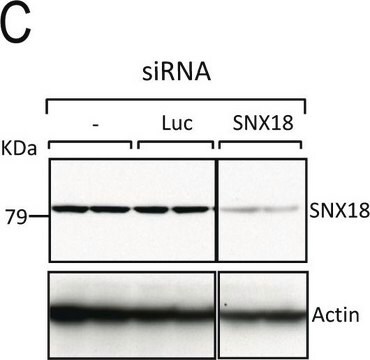ABN99
Anti-phospho NR1 (Ser897) Antibody
from rabbit, purified by affinity chromatography
Synonym(e):
glutamate receptor, ionotropic, N-methyl D-aspartate 1, N-methyl-D-aspartate receptor subunit NR1, glutamate [NMDA] receptor subunit zeta 1, N-methyl-D-aspartate receptor channel, subunit zeta-1, glutamate [NMDA] receptor subunit zeta-1
About This Item
Empfohlene Produkte
Biologische Quelle
rabbit
Qualitätsniveau
Antikörperform
affinity isolated antibody
Antikörper-Produkttyp
primary antibodies
Klon
polyclonal
Aufgereinigt durch
affinity chromatography
Speziesreaktivität
rat
Speziesreaktivität (Voraussage durch Homologie)
mouse (based on 100% sequence homology), human (based on 100% sequence homology)
Methode(n)
immunohistochemistry: suitable
immunoprecipitation (IP): suitable
western blot: suitable
UniProt-Hinterlegungsnummer
Versandbedingung
wet ice
Posttranslationale Modifikation Target
phosphorylation (pSer897)
Angaben zum Gen
human ... GRIN1(2902)
mouse ... Grin1(14810)
rat ... Grin1(24408)
Allgemeine Beschreibung
Spezifität
Immunogen
Anwendung
Neurowissenschaft
Signalübertragung & Neurowissenschaft
Immunoprecipitation Analysis: 10 µg from a previous lot immunoprecipitated NR1 from rat brain microsomal RIPA lysate.
Western Blot Analysis: 2 µg/mL from a previous lot detected NR1 in Lambda phosphatase untreated and treated rat brain microsomal tissue lysate.
Qualität
Western Blot Analysis: 1 µg/mL of this antibody detected NR1 on 10 µg of rat brain microsomal tissue lysate.
Zielbeschreibung
Verlinkung
Physikalische Form
Lagerung und Haltbarkeit
Hinweis zur Analyse
Rat brain microsomal tissue lysate
Haftungsausschluss
Sie haben nicht das passende Produkt gefunden?
Probieren Sie unser Produkt-Auswahlhilfe. aus.
Lagerklassenschlüssel
12 - Non Combustible Liquids
WGK
WGK 1
Flammpunkt (°F)
Not applicable
Flammpunkt (°C)
Not applicable
Analysenzertifikate (COA)
Suchen Sie nach Analysenzertifikate (COA), indem Sie die Lot-/Chargennummer des Produkts eingeben. Lot- und Chargennummern sind auf dem Produktetikett hinter den Wörtern ‘Lot’ oder ‘Batch’ (Lot oder Charge) zu finden.
Besitzen Sie dieses Produkt bereits?
In der Dokumentenbibliothek finden Sie die Dokumentation zu den Produkten, die Sie kürzlich erworben haben.
Unser Team von Wissenschaftlern verfügt über Erfahrung in allen Forschungsbereichen einschließlich Life Science, Materialwissenschaften, chemischer Synthese, Chromatographie, Analytik und vielen mehr..
Setzen Sie sich mit dem technischen Dienst in Verbindung.








